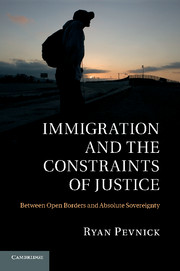Book contents
- Frontmatter
- Contents
- List of illustrations
- Acknowledgments
- 1 Introduction
- 2 Statism, self-determination, and associative ownership
- 3 Refining associative ownership
- 4 Rights-based arguments for open borders
- 5 Distributive justice and open borders
- 6 The significance of national identity
- 7 Applications
- Bibliography
- Index
2 - Statism, self-determination, and associative ownership
Published online by Cambridge University Press: 24 February 2011
- Frontmatter
- Contents
- List of illustrations
- Acknowledgments
- 1 Introduction
- 2 Statism, self-determination, and associative ownership
- 3 Refining associative ownership
- 4 Rights-based arguments for open borders
- 5 Distributive justice and open borders
- 6 The significance of national identity
- 7 Applications
- Bibliography
- Index
Summary
Although there may be discord about the scope and limits of self-determination, it is widely accepted – in everyday political discourse, international law, and political theory – that some principle of self-determination is justified. This chapter argues for a particular justification and account of the right of states to govern themselves. Appreciating the justification for self-determination will allow us to better understand how the principle bears on arguments regarding immigration.
I begin by considering and rejecting a position according to which sovereignty is unlimited, such that the needs and interests of foreigners impose no constraints on self-determination and the formulation of immigration policy (section I). Having seen that an unlimited principle of self-determination cannot pass muster, it becomes important to understand the justification or basis for accepting a principle of self-determination. This is because it is only by understanding the justification for such a principle that we will be in a position to understand its limits.
After explaining the difficulty of justifying self-determination (section II), I introduce the “associative ownership” account (section III). Although I believe that this is a natural and intuitive basis from which to defend a principle of self-determination, it is important to provide an explicit defense. Moreover, explicating the associative ownership view demonstrates that it – unlike other justifications of collective self-determination – can be extended to states (section IV). I then show that this view coheres with, and can account for, intuitive judgments regarding the appropriate bounds of self-determination (section V).
- Type
- Chapter
- Information
- Immigration and the Constraints of JusticeBetween Open Borders and Absolute Sovereignty, pp. 19 - 52Publisher: Cambridge University PressPrint publication year: 2011
- 1
- Cited by



